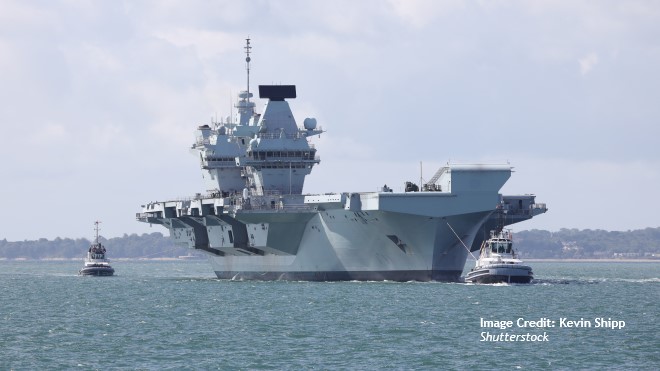The UK’s Pivot to the Indo-Pacific

(This is the second blog post in a series of similar posts on HMS Queen Elizabeth’s maiden voyage to Asia – Click here for the first post the series)
Rebirth of Global Britain
The UK’s new aircraft carrier, HMS Queen Elizabeth, has just set sail on her maiden voyage, meant to reclaim the position of a Global Britain, act as a show of strength to its foes, and express enduring commitment to the country’s allies. In the wake of London’s official departure from the European Union, the voyage is of serious importance. The final destination is set for Japan, with stops in allied harbors along the way and a potential diplomatically sensitive passage through the South China Sea. The UK’s deployment of its greatest ever aircraft carrier, accompanied by its strongest battle group since the Falkland Wars (including an Astute-class submarine with Tomahawk cruise missiles), to the Indo-Pacific for its first voyage underscores the new emphasis London is putting on the region.
The Post-Brexit Reality
The HMS Queen Elizabeth and her sister ship, the HMS Prince Philip, were commissioned before the Brexit vote. Nevertheless, the optics and diplomatic significance of starting to operate Europe’s greatest aircraft carrier group just after leaving the European Union is a PR boon to post-Brexit Britain. The importance of the maiden voyage may also be heightened vis-à-vis Britain’s relationship to China. In a review of British military and foreign policy made public in March of this year, the rise of China is described as the most important geopolitical event of the 2020s. It also singled out China as the nation posing the greatest threat to the UK’s economic security. Lastly, the review called for a pivot towards the Indo-Pacific region.
When the UK was a member of the EU, they had greater insulation from economically damaging diplomatic spats due to their place in the world’s largest single market, to which strong economies like China desired access. The UK is still a strong economy in its own right, but its national market is not vital to most other nations, leaving them more vulnerable to diplomatic retributions from nations like China. This newfound vulnerability makes power projection increasingly important, as well as the need to deepen bonds with allies. HMS Queen Elizabeth can do both.
Indo-Pacific Strategy
In 1967 the UK decided to withdraw from regions “East of Suez”, despite the fact that their presence in Singapore and Malaysia just before the withdrawal was the largest and most expensive of the UK’s global commitments. Shortly thereafter, the UK entered the Five Power Defence Agreement (FPDA) with Malaysia, Singapore, New Zealand, and Australia in 1971. The FPDA does not have any mutual defense obligations in case of an attack on a member, such as NATO, but interest in the organisation has increased in the UK since Brexit, for it serves as a natural avenue into the geopolitics of the Indo-Pacific. Malaysia’s political interest in the agreement might however be waning. A stop by the HMS Queen Elizabeth-led flotilla in Malaysia to commemorate the 50th anniversary of the FPDA might help reignite interest in the agreement and deepen cooperation. Since the UK does not have a seat in the ASEAN Defence Ministers’ meeting-Plus (ADMM-Plus), arguably the most important military cooperation body in the Indo-Pacific, rejuvenating the FPDA might offer another avenue into the region. The expedition could also serve to move London closer to membership in the Quad, an alliance between the US, Japan, Australia and India, which is increasing its security cooperation.
The HMS Queen Elizabeth’s final leg to Japan is also important for the UK’s strategy to increase their presence in the region. Japan is Asia’s second-largest economy and a natural ally in the struggle to counter China’s growing influence and threat potential. Besides the merit of deepening bonds with Japan and the Japanese Self-defense Forces, Japan is also home to the US’ greatest foreign military presence – some 54,000 troops. With the US growing tired of their European NATO allies not living up to their military expenditure commitments, not yet substantiated rumors of the HMS Queen Elizabeth being stationed in Japan or the Indo-Pacific in the future could point towards an effort by the UK to curry favor with the US and deepen their relationship with Washington and other Indo-Pacific allies by making their resources readily available in the region.
A Focus on Friends, Not Foes
The rhetoric ahead of the maiden voyage was consolatory, focusing on building deeper bonds with allies, emphasising the UK’s increased interest in the Indo-Pacific, and trying to position the voyage as a peaceful one, free of intentional provocations of potential foes. The UK still lacks the capacity to conduct US-style freedom of navigation operations on its own and will probably be cautious when it comes to provoking China. Even if they had the capacity, it is not clear they would conduct such operations. The maiden voyage is partially meant to protect the UK from the threat they see China poses to their economic security, not to provoke Beijing and push them towards the kind of retribution the UK is making friends and influencing allies in the region to prevent.